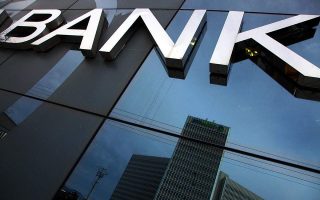Hugo Velez to Kathimerini: Securitizations a tool in the fight against NPLs

With significant experience in the management of nonperforming loans (NPLs) and real estate owned properties (REOs), and more than 20 billion euros of managed assets, HipoGes Iberia, a KKR group company, enters the Greek market under the dual capacity of NPL manager and real estate services provider.
Transferring the experience of countries such as Spain, Italy and Portugal, whose banking systems have faced high levels of nonperforming loans, the general manager of HipoGes, Hugo Velez, speaks to Kathimerini about the plans of the Spanish group in Greece and explains why the market of NPL servicers, which already counts 20 licensed firms in this country, will gradually consolidate into fewer players.
Following the acquisition of Alsvit, a company which provides real estate services mainly to Greek banks, HipoGes is expected to play a significant role in the real estate sector, which according to Velez presents opportunities but also challenges, due to its significant fragmentation.
HipoGes group is active in the markets of Spain and Portugal, two countries that are characterized by high levels of nonperforming loans. What similarities and differences have you discerned between those countries and the Greek market?
In the last 10 years, all Southern European banking systems faced a significant increase in nonperforming loans, with Italy and Spain being the largest markets by absolute size. In terms of nonperforming exposures (NPEs) as a percentage of total loans, or gross domestic product (GDP), Greece and Cyprus demonstrate the highest percentages, reflecting the deeper economic crisis that occurred in previous years. Apart from differences in size, there are also differences in the composition of the NPE markets, as well as in the phase of development of each market, the degree of regulation and supervision, the overall legal framework etc.
For example, in Spain, which is a market characterized by RE development and construction loans, some of the investors that were initially acquiring portfolios are already disposing some of these portfolios to other investors. The Spanish market is considered more mature in terms of the variety of NPE or RE investors that are active there, while the RE market is supported by ample bank financing. Finally, in Spain, a central “bad bank” was created early enough, Sareb. The recent carve-out platforms established by systemic banks such as Eurobank and Piraeus in Greece are similar to the four main platforms (Haya, Altamira, Servihabitat and Solvia) that were created by the main banks in Spain.
The Portuguese market has in general more similarities to Greece, in the sense that banks there had also been trying to manage NPEs on their own or with the help of external providers. Only in recent years have we seen significant transactions on NPEs and indeed, securitizations, which is in line with what we are seeing in Greece mainly since the second half of 2018. A unique characteristic of the Greek financial system is the dominance of only four banks, and this is to some extent being replicated in the carve-outs of the recovery units of these banks into very large systemic NPL servicers, which we call the “mega-servicers.”
In Greece, some 20 NPL management firms have been licensed, while the licensing of others, including HipoGes, is pending. Do you believe there is room for so many companies?
It is true that in Greece we have a large number of servicers, which even exceeds that of Spain, where we have some 15 servicers, while in Portugal there are about six corresponding companies. In Greece, in reality, NPL management is mainly conducted by the few mega-servicers that are coming out of or are controlled by the four systemic banks. So on one hand you have a few very large servicers, next to which there are others with practically no activity. I anticipate that eventually a smaller number of companies will remain, probably around 10 firms, a tendency that is already beginning to take shape.
Without overlooking the peculiarities of each market, clearly the arrival of international servicers in a market enhances and accelerates the introduction of recovery solutions that have already been successfully tested in other countries. This is to the benefit of borrowers, investors and the banks themselves. Nevertheless, one has to admit that this is a daunting task and we should not underestimate either the work required to achieve long-term viable solutions or the importance of the macroeconomic environment required to support this transformation. In practice this work will require effective servicing solutions and a creditor-friendly legal framework. Otherwise the problem will drag on, hindering the recovery of the banks and their ability to finance the economic rebound.
Which model do you consider most effective for the reduction of NPLs in Greece?
In general, the structure of the market differs from one country to another, but the carve-out model, of separating and transferring a large part of the NPL portfolio of a bank into another company, can be observed in most markets. Right now, as I mentioned, we have under way the creation of the mega-servicers that have basically come out of the banks and will be managing the majority of the nonperforming loan stock. However, these NPLs will still be in the books of the banks, so in the coming years, the aim will be to get these NPLs out of the banks' balance sheets, so that they can focus on financing economic activity.
Proposals such as that of the Hellenic Financial Stability Fund (HFSF), which is close to the Italian model, can be strongly supportive in this effort, especially now, with the positive developments in the bond market. In the end, today’s NPL stock will have to be either securitized or sold, so that the Greek economy can really turn the page. Considering that during this deleveraging process the Greek market will move toward the securitization solution, HipoGes has extensive experience in managing securitized portfolios as a servicer. For example, in Portugal, we own a securitization vehicle, which is used by third-party investors when acquiring portfolios from the local banks, in relevant securitization transactions.
How do you see the REO market in Greece?
Unlike NPLs, the Greek REO market is relatively small in size when compared internationally, and this is primarily due to the halt in auctions for several years. In addition, the Iberian markets are heavily geared toward construction and real estate development loans, and I believe these two are the most important differentiating factors for the REO markets between these countries. A third factor, which is actually a disadvantage of the Greek market, is that in the Iberian markets you have whole developments, which one can acquire, finish and dispose of, while in Greece the REO portfolios are scattered across the country. So, theoretically, they are viewed by investors as less attractive or more difficult.
Considering the above, clearly the Greek REO market has a long way to go, taking into account also the significant participation of “strategic defaulters.” If you think of the number of real estate assets that have to change hands in various ways, this is a huge task, which will require a lot of work and effort. We are confident though that servicers like HipoGes or others with experience in such transactions will play a key role in the absorption and management of the big flow of REOs expected to be generated in the upcoming months and years.
What is your strategy in the real estate sector?
As far as REOs are concerned, there were no auctions for a few years, and this has led to an increase in strategic defaulters. Since last year, auctions have resumed. Given the still fragile state of the real estate market, it is no surprise that the “winners” in the auctions are mostly the banks themselves, which have purchased more than 80 percent of those assets. Therefore, HipoGes aspires on one hand to support the mega-servicers and the banks in their repossession efforts, and on the other hand to offer high-quality and cost-effective solutions to the whole real estate market. On the other hand, we believe that our track record in portfolio sales in Portugal and Spain, and our actual client base, will be key in the pipeline of portfolio sales in the next 12-18 months.
HipoGes recently acquired Alsvit in Greece. What is your aim through this acquisition?
HipoGes Group is focused primarily on collateralized NPEs and REOs. In Greece, a market depressed for many years, we see a lot of potential and for this reason have decided to expand and invest in the real estate services market, with the acquisition of a majority stake in Alsvit PC, a company which provides real estate services, primarily to banks. Alsvit offers the full spectrum of RE services, from asset valuation and pre-acquisition support to full sale preparation and execution and is one of the leaders in providing real estate services to the banks.
In addition to real estate management, Alsvit has extensive experience in refurbishment and construction, construction of retail branches and stores and other types of commercial and residential buildings. With two main offices in Athens and Thessaloniki, Alsvit operates with an effective in-house team of lawyers and engineers, who are experienced in resolving the complex REO legal and urban planning issues and managing the firm’s external collaborators.
Going forward, Alsvit will be the HipoGes arm in the real estate services sector in Greece. We will be augmenting Alsvit's capabilities, supporting the company with our cutting-edge technology, asset management know-how and capital. This way we are confident we will be offering professional services to the market, from valuation and acquisition support to the final sale, including our ability to finish semi-finished constructions, or refurbish older buildings, at very competitive terms. Consequently we believe that HipoGes/Alsvit will be playing a key role in the anticipated transformation of the Greek real estate market.
HipoGes Iberia
HipoGes Iberia was founded in late 2008, with the aim of becoming a leading independent servicer, effectively covering the Spanish and Portuguese markets. In 2013 HipoGes was rated “above average” by Standard & Poor’s for special servicing of residential mortgages, while in 2017 HipoGes was rated “average” by S&P for special servicing of commercial real estate. In 2018 assets under management reached the 20-billion-euro mark. During the same year, KKR became the major shareholder of HipoGes Iberia.
Today, HipoGes is one of the leading asset management platforms for distressed assets in Southern Europe, and with offices in Spain, Portugal, Greece and Italy, it works for some of the leading financial institutions and international investors specialized in the distressed assets sector. HipoGes manages a very broad spectrum of assets, including residential mortgages, corporate and small and medium-sized business loans, commercial real estate, unsecured loans, government and corporate receivables, and REO portfolios. It provides services all along the investment cycle, from due diligence and pricing advisory, to closing and structuring, and then to loan servicing / legal enforcement, RE management, disposal strategy, reporting and overall portfolio management.





